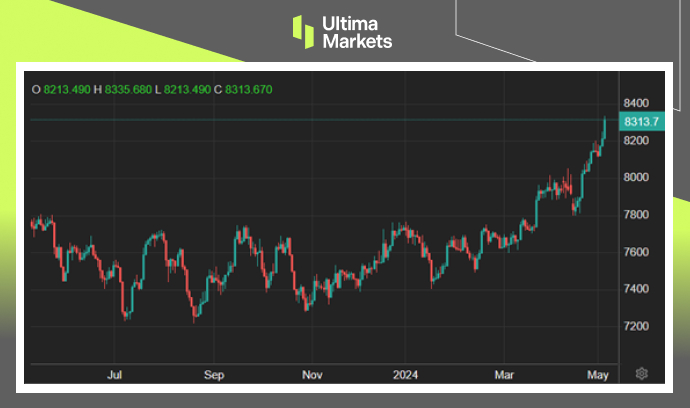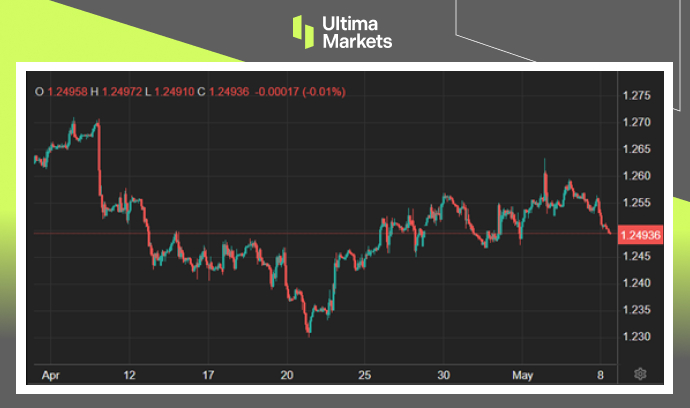You are visiting the website that is operated by Ultima Markets Ltd, a licensed investment firm by the Financial Services Commission “FSC” of Mauritius, under license number GB 23201593. Please be advised that Ultima Markets Ltd does not have legal entities in the European Union.
If you wish to open an account in an EU investment firm and protected by EU laws, you will be redirected to Ultima Markets Cyprus Ltd (the “CIF”), a Cyprus investment firm duly licensed and regulated by the Cyprus Securities and Exchange Commission with license number 426/23.

FTSE 100 Reaches Record Peak, Market Eyeing BoE’s Rate Decision
TOPICSThe FTSE 100 had a strong performance on the trading day after the Early May Bank Holiday. It reached an intraday record peak of 8,335.68, representing a 1.49% climb. By the end of the session, the index closed at 8,313.67, marking a 1.22% gain for the day. The rise mirrored the previous two sessions’ increases seen across European equities, as the market enjoyed the anticipated interest rate reductions by leading global banks.
The prominent industrial mining sector emerged as one of the highest climbers, recovering from the previous week’s subpar performance. Fresnillo experienced a 3.3% jump, while Rio Tinto and Glencore experienced gains ranging from 3% to 2%, buoyed by China’s commitment to economic stimulus and interest rate cuts during its Labor holiday, which boosted morale for base and precious metals.
Property developers sensitive to rate shifts also exhibited strong performance; companies like Persimmon, Barrat, and British Land saw their shares go up from 2.8% to 3.5%, benefitting from the significant drop in Gilt yields that bode well for the mortgage demand forecast.
On the downside, BP’s shares fell by 1.3% following the revelation of lower-than-expected profits for the first quarter. Nevertheless, the continuation of its stock repurchase scheme helped mitigate a steeper drop during the trading day.

(FTSE 100 Index Yearly Chart)
The British pound traded around the $1.25 level, as investors closely watched the anticipated timing of interest rate cuts. While the Bank of England is expected to maintain rates unchanged during its upcoming May meeting, market participants are fully pricing in the first rate reduction in August instead of September. In April, BoE Governor Andrew Bailey expressed optimism, noting that British inflation appeared on track to meet the 2% target. UK inflation fell to 3.2% in March 2024, the lowest rate since September 2021, down from 3.4% in the previous month. The headline inflation had reached its peak of 11.2% in October 2022.

(GBPUSD Monthly Chart)
Disclaimer
Comments, news, research, analysis, price, and all information contained in the article only serve as general information for readers and do not suggest any advice. Ultima Markets has taken reasonable measures to provide up-to-date information, but cannot guarantee accuracy, and may modify without notice. Ultima Markets will not be responsible for any loss incurred due to the application of the information provided.
Why Trade Metals & Commodities with Ultima Markets?
Ultima Markets provides the foremost competitive cost and exchange environment for prevalent commodities worldwide.
Start TradingMonitoring the market on the go
Markets are susceptible to changes in supply and demand
Attractive to investors only interested in price speculation
Deep and diverse liquidity with no hidden fees
No dealing desk and no requotes
Fast execution via Equinix NY4 server















